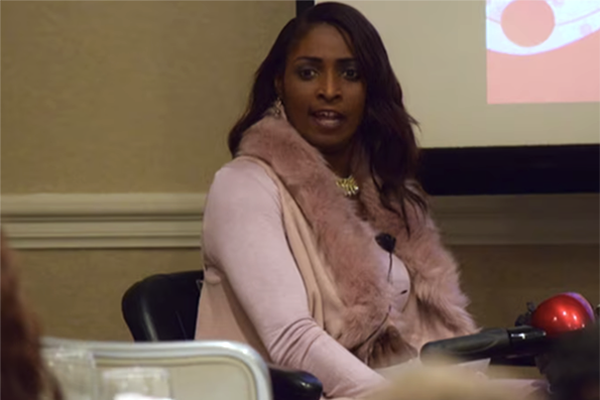From the Developmental Disabilities Network Journal: Loving My Skin

Shari Cooper
This post is reprinted from the Developmental Disabilities Network Journal with permission from the author. For more research and perspectives on diversity, equity, inclusion and disability, take a look at the latest issue.
Having a disability poses its challenges. Being a Black woman with a disability is a whole different ball game.
I learned early in life, as the youngest of the six “Super Coopers” children, that for me to get my wants and needs met, I was going to have to learn how to advocate by speaking up for myself. This was not an easy task because, besides having the physical disability of cerebral palsy, my disability also included a speech impairment. When one has a speech impairment, many people don't take the time to hear what you want or even what you are trying to say. I worked hard to make my voice stronger and my articulation tactics clever.
So, I would be heard.
Growing up, I read about Black women of power, but I'd never seen a Black woman hold a real position of power.
As I grew, so did my passion for advocacy. I started young, advocating for myself. Little things, such as speaking up at doctor’s appointments, Individualized Educational Program (IEP) meetings, and even ordering pizza over the phone, started my journey to becoming one of the sought-after advocates in Ohio.
I started joining advocacy groups, organizations, and boards—local and statewide—where I saw I could make a difference by sharing my knowledge and experience. The Ohio Developmental Disabilities Council, Ohio Governor's Council, and the Disability Foundation are just a few of the organizations that have pushed me along on my journey.
From there, I went nationwide by being elected as a member of the Board of Directors for the National Association of Councils on Disabilities. Soon, I was elected vice-chair of the group. I then realized the work I had to endure to succeed had paid off. No longer could I say I hadn't seen a Black woman hold a position of power.
Because I was that woman.
Due to many of the initiatives Ohio has put in place for people with disabilities, I’ve accomplished great things in my skin.
During my time on the Ohio Developmental Disabilities Council, I served on the Outreach Committee. The Outreach Committee’s mission was to make sure we served the unserved and underserved population. As a result of the committee’s outreach work, many grants were given to help Black and Brown people with disabilities living in urban areas learn about and receive services they would’ve not otherwise known about. Also, during my reign, the creation of ReachOut e-Diversity Newsletter was born. Thanks to the publication, many people are being informed on the topics of diversity, receiving services, and making inclusion a priority.
Ohio is also very invested in making sure Ohioans with disabilities have a good quality of life. I’m happy to say the Buckeye state is a Technology First state, meaning that any piece of technology that helps one be or become more independent in their everyday life will be considered and paid for as a part of their support and services plan. Because of this initiative, many people with disabilities are living and working independently—including myself.
The Buckeye state is also an Employment First state. It’s no secret that it's harder for people with disabilities to gain employment. Some employers still view people with disabilities as unable to work. This myth is far from the truth because people with disabilities are some of the best workers around. I can attest to this, for I’ve been employed with Goodwill Easter Seals Miami Valley for 20 years. Currently, I hold the position of Public Relations Assistant.
Although I held an Associate Degree in Disabilities Intervention Services, I had a hard time finding employment after graduating from Sinclair Community College. I hate to admit it, but I know the reason for my employment difficulties was due to my visible physical and speech disability. Thanks to Ohio becoming an Employment First State that’s working with employers to promote the value of hiring people with disabilities, my fellow peers who are still on this path— including the ones who look like me—will have fewer difficulties finding employment.
Other concerns Ohio is working on include abuse against people with disabilities, lack of disability leadership, and strengthening advocacy—all of which I’m very proud to be a part of. With this continued work, I hope to help create an environment that’s welcoming for women who look like me to lead.
Although we still have a way to go, I think Ohio sets opportunities for those such as me, who love their skin, to make strides. Do I think discrimination still rears its ugly head around the issue of ethnicity, gender, and disability? Yes. But I will not stop voicing my thoughts on this matter until I see the representation of my unique intersectionality among my counterparts, around the table, where decisions are made.
In conclusion, as I see the first African American woman, Vice President Kamala Harris, holding the second-highest position in the United States, it makes me extremely proud and happy. I know she may have endured unfair treatment from a world that’s often color-struck, yet she didn’t stop climbing until she reached the top.
I’m so happy to see someone in a position of power who looks like me. This landmark event leaves me hopeful that in the future the world will not judge anyone by the color of their skin, gender, or disability but by their knowledge and capacity to carry out a position successfully.
I’ll keep hope alive, for I’m hopeful that one day we’ll all live in a world that values fairness. Until then, I'll keep loving my skin, striving for success, and speaking up for what I believe in.

